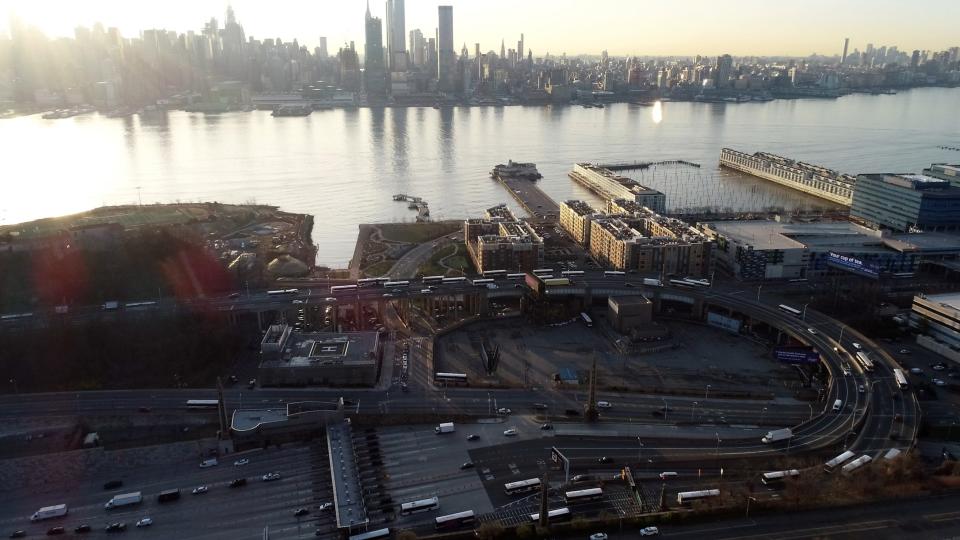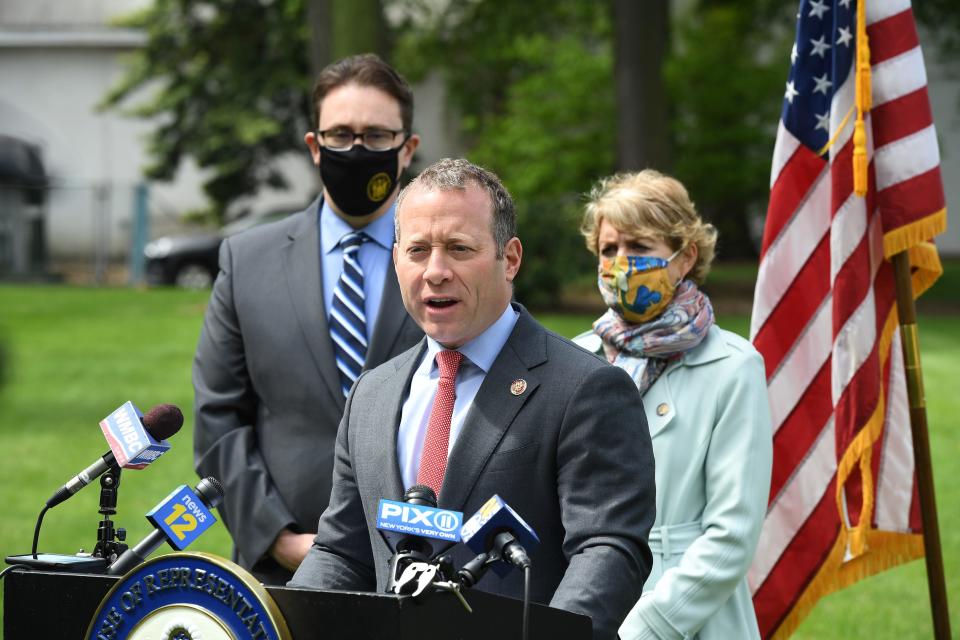$23 to enter Manhattan? Murphy seeks legal options after 'unfair' congestion pricing OK'd
- Oops!Something went wrong.Please try again later.
- Oops!Something went wrong.Please try again later.
The Federal Highway Administration approved the Metropolitan Transportation Authority’s plan to add a controversial toll around Manhattan’s central business district, just hours after Gov. Kathy Hochul and New Jersey Gov. Phil Murphy rubbed shoulders at a Regional Plan Association event where they discussed their partnership on transportation issues.
The tolling plan, which the two governors don't agree on, would charge New Jersey drivers more to enter Manhattan. It was not mentioned at the event — and Murphy is now "closely assessing" legal options over the decision.
The New Jersey governor called the decision "unfair," "ill-advised" and a "money grab," in a statement released Friday afternoon.
"Since Day One, I’ve stood against the disproportionate negative impacts of congestion pricing on New Jerseyans – a greater financial burden on New Jersey commuters, double tolling, toll shopping, a lack of revenue for NJ Transit, outsized environmental burdens on certain North Jersey communities, and financial impacts on the Port Authority’s capital budget," Murphy's statement read.

"As a conceptual matter, I support congestion pricing, but it must be structured in a way that is fair to all sides. UntiI New York’s congestion pricing plan is fixed, I will keep working closely with partners from both states and both sides of the aisle, including Congressman (Josh) Gottheimer and our congressional delegation, to halt implementation of this misguided tolling plan. Our administration is closely assessing all legal options.”
Murphy has in the past threatened to veto Port Authority of New York and New Jersey minutes over the matter.
The FHWA’s decision about the plan — which could charge drivers as much as $23 to enter Manhattan below 60th Street — was announced about four months after a decision was expected.
This will be the first congestion pricing program in the country, following other countries, like Singapore and Sweden.
"Congestion pricing is a generational opportunity to make it easier for people to get around in, and get to, the Central Business District, by reducing traffic and funding improvements to the public transit system," said John J. McCarthy, the MTA's chief of external relations. "To do it right, environmental equity has been an integral component. We are grateful that the FHWA has acknowledged the Project Sponsors’ efforts to date and has found the document has met the standards for legal sufficiency."
Earlier this week, seven members of New Jersey’s congressional delegation penned a letter to Hochul calling on her to cancel the plan. They urged her to “come to the table with Gov. Phil Murphy and NJ Transit to develop new plans to reinvest in affordable public transit options in our region.”
Gottheimer, the most vocal New Jersey elected official against the plan, told reporters on a call Friday afternoon he found the decision “completely outrageous.”
“For folks who are struggling to make ends meet, this is a devastating blow,” he said. “Every single nickel that the MTA will literally pilfer at the pockets of Jersey families will go to the MTA.”

The seven members of Congress argue that New Jersey commuters who go into Manhattan already contribute a great number of dollars to New York’s economy through income tax and hefty tolls on the Lincoln and Holland tunnels and George Washington Bridge, crossings operated by a bistate agency, the Port Authority of New York and New Jersey.
The MTA would use the money generated from the tolling program to fund its capital plan to improve subways and buses, while also reducing pollution and congestion in the most trafficked part of the region. Last year, the agency released a 4,000-page environmental assessment that provided seven scenarios outlining different ways to charge vehicles and weighing whether some vehicles should be credited, like buses or those that use crossings that already have tolls, like the Lincoln and Holland tunnels.
Among the reasons New Jerseyans have taken issue with this is because they were largely kept out of the agency’s planning for the toll program and because none of the money would be used to improve New Jersey’s public transportation network, which could see more riders if people choose to avoid the extra toll.
Last year, Murphy called on the U.S. Department of Transportation to require the agency to do a more thorough environmental review and slow down the approval process for the plan.
Murphy has also noted in the past that the tolling program could have severe consequences without capacity improvements at New York Penn Station and the Port Authority Bus Terminal, the main portals for the vast majority of New Jersey commuters who already use public transportation to get to Manhattan. Improvement plans are underway at both facilities, but years away from completion.
The FHWA, in its letter to the MTA, said its environmental review “mitigates the adverse effects from the preferred alternative” and must allow 30 days for public review. After that, a toll board will be assembled – which does not include representatives from New Jersey – that will decide how the tolling program will work, what vehicles and crossings (if any) get credited or exempt, and when the program would go into effect.
This article originally appeared on NorthJersey.com: Congestion pricing NYC approved, Murphy seeks legal way out

